Caroline Leavitt's Blog, page 130
January 19, 2011
Jonathan Evison talks about West of Here
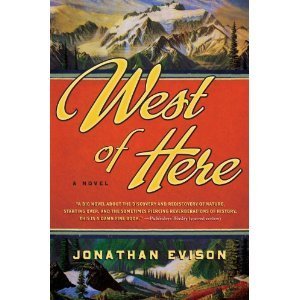
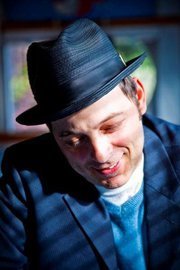
I can't tell you how thrilled I am to be asking Jonathan Evison questions on my blog. First, you have to know that he's a knockout, genius writer who has written THE book of 2011. (Don't take my word for it, look at the starred advance reviews from PW, Booklist and Library Journal. Look at how Vanity Fair raves and he's the number one indie pick.) But even more importantly, you have to know what an incredibly funny, kind and truly generous guy he is. I personally would like to bottle him and sell him if I could. (How about, it Johnny, we could make a killing.) So thanks, Johnny, for both the incredible book and for the personality that goes along with it.
I read somewhere that you wrote this before All About Lulu? I loved Lulu but this book is so much larger in scope I'm trying to figure out how one evolved from the other. Why didn't you publish this one first?
Nah, I was researching West of Here while I was writing Lulu. Lulu being a first-person voice novel, practically wrote itself. I knew with West of Here I really wanted to push myself as a craftsman. I wanted to use every tool in my belt and a few I didn't have. It's rather shocking to me--after the fact-- that the novel has enjoyed such a broad appeal. With 41 limited points-of-view, and a hundred odd years to cover, i was afraid I might lose a lot of readers.
You also told me that part of why you have such thick skin is that you wrote six novels before All About Lulu that no one wanted. I find this incredible, both that no one wanted them, and also that you were able to persevere and keep writing and remain incredibly cheerful. Was this out of need or belief in yourself or both?
If you'd read most of them, you see it wasn't so incredible that nobody wanted to publish them. The first three were all out stinkers. As far as what keeps me going, it's the process of writing itself. I need it to distill all the stuff life throws at me. Not that it's always a barrel of monkeys--writing West of Here probably took a couple of years off my life. And writing the book I just finished, literally broke my heart. But I always feel like I come out the other side a better person.
Where did the whole idea for West of Here come from and how did you manage to seemingly effortlessly juggle all the story and time lines?
Well, I wanted to bring the history of the Olympic Peninsula--the history of America, really--to life on the page. But I didn't want to write a historical novel, per se, rather a novel about history, about footprints, who makes them and who follows them, etc. And rather than employ a wide-angle lens to historicize the material, I wanted my lens to be a kaleidoscope of overlapping limited points-of-view, so that the living history which I sought to create, was democratic. In my experience, most "histories" only tell one side of the story. As far as juggling all those POV's, it wasn't effortless--it was a big fat pain in the ass, but in the end, exhilarating.
Gertie, one of my favorite characters in the book, says that a "person is made up of choices", an idea which keeps playing out through the book. But how much real choice do you think we have in our own choices, especially when we are hurtling through the forces of history?
Well, for starters, you have the choice to complain or make lemonade, as it were. I think this fundamental choice in outlook has a far-reaching effect on any life, and also on all the lives that touch that life. Determination and optimism are choices, and from what I've observed, they can pay big dividends. Or not. Either way you feel better, and the people around you feel better.
The line "we are haunted by ourselves" links the past to the present (at least it does for me), Do you think it's ever possible to escape our past, all that has come before us, or do you think it is coded into our DNA?
Absolutely it's possible to escape our past. It may be hard as fuck, but it's possible, and we all know folks who have done it. I don't think you can outrun your past, I don't think can hide from it, but I know for a fact you can turn around, look it in the face, accept it, and move on. That's what Port Bonita is trying to do, and that's what America ought to do. The world, really.
I deeply admired how the tone and the writing changed in the historic parts and present day. How difficult a hire wire act was this? Did you ever feel discombobulated?
To write these two epochs in American history in the same voice would have been a disservice to the narrative, I think. We don't speak the same language we did in the nineteenth century, figuratively or literally. Manifest destiny, for instance, is no longer a commonly accepted ethos. We know longer think anything is possible, not without without paying a few fiddlers, anyway. Cynicism is far more common these days. And the government's not giving away land to anyone with a shovel, anymore.
OK, tell me what's coming up next for you besides richly deserved fame and glory and maybe some more rabbits?
Well, I'm done with my next novel, The Revised Fundamentals of Caregiving, which will pub sometime in '12 or '13. Again, it's a departure from West of Here, which is a novel of big themes and ideas. The Revised Fundamentals of Caregiving is a novel of the heart. I think it is at once the saddest and funniest thing I've written. At present, I'm deep into a new novel, The Dreamlife of Huntington Sales, which is possibly a more ambitious narrative enterprise than West of Here. IF IF IF it works-- but the real joy, is finding out.
January 18, 2011
Alice Hoffman talks about The Red Garden

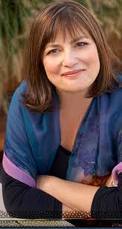
Alice Hoffman really needs no introduction, but I want to give her one anyway. A bestselling author for adults and young adults, a screenwriter, and humanitarian (she does great, great work for breast cancer), she's also beloved by her legions of readers AND she knows and loves NYC's City Bakery, renowned for the best hot chocolate on the planet. I took the arc of The Red Garden with me everywhere, from the NYC subways to a book convention in Michigan. I'm thrilled Alice agreed to answer my questions. Thank you so much, Alice!
What I really loved, beside the shimmering language, was how strong and powerful the women were, something that kept being passed down through the generations. Could you comment on that?
The Red Garden is very much about survival – in the natural world, in the world of loss and love. The women in the book all have the will to survive, even in the most extraordinary circumstances, and I think there is a sense of knowledge and experience being passed down throughout the history of the town.
The Red Garden had so much of a magical fairy tale quality to it, but by that, I mean The Brothers Grimm—the real, dark fairy tales that haunt you, rather than the happier Disneyfied versions. Would you agree? And where did that love of fairy tales come from?
I grew up reading fairy tales, and always felt they were the stories that didn't talk down to me as a child-reader. The darkness inherent in Grimm's' Tales, and the Russian fairy tales my grandmother told me, seemed "true". I think children understand that fairy tales are often journeys that chart growth – growing up, finding oneself or one's true love. Real fairy tales are often brutal, and beautiful as well.
The Red Garden, explores the threads that link people and places and memories together from the 1700s to the present. You've explored before, in Blackbird House, how a place can become a character and a catalyst, and how the natural world can influence or impact our choices. Do you feel that we can ever escape our pasts or our places—and should we?
In Blackbird House the focus was a house, and the ways in which an old house can contain many stories, many lives. In The Red Garden I think the complications are more complex --- it's the story of a town, but also of the complicated relationships and personal histories of the residents. I made a "family tree" after the book was completed and was surprised to find how inter-related everyone was, and how many secrets were never discovered.
I loved reading about Johnny Appleseed in The Red Garden, and truly, the novel is filled with history. I was wondering how much research you did or if you let your imagination take over?
I did quite a lot of research, and I was surprised at how my vision of Johnny Appleseed was formed by Disney. He was a truly remarkable character – a precursor to the hippie movement, a true believer. For each story, I researched the time period and my characters grew out of the time periods in which they lived.
I've been reading your work since Property Of . It seems to me that your earlier works feel and read differently than your later ones, which isn't to say they allaren't terrific. I'm wondering how much of this is organic or conscious or a little of both? Do you feel that as you yourself change, so does your writing?
I think most writers have themes or obsessions, but I agree that a writer's work changes with life and work experience. What you write at a very young age reflects who you are as a writer in a particular moment in time. It makes sense that as you experience the world your vision evolves. Hopefully, we get smarter and are more compassionate as time goes by.
People talk about how difficult it is to translate good books into good films. Obviously the forms are different. It's funny, but Independence Day (a wonderful film that you wrote), feels like an Alice Hoffman movie, but Practical Magic, though enjoyable, did not. Maybe it's that word "based on a novel by", which changes the story for filmic purposes. Or maybe it's simply because you didn't write the script. So, I'm curious. Had you ever envisioned Independence Day to be a novel or was it always a script, and do you think that's why it felt like such an intrinsically Alice Hoffmanesque film? Is there a way to solve this problem of better translating a book onto the screen?
I wrote the screenplay of Independence Day so it was "mine" in a deeper way – I wasn't the screenwriter or involved in the production of any of the films made of novels. Independence Day was never envisioned as a novel; it was always meant to be a film. I think a novel can make for a great film, but it has to be a unified vision. The practice of having three or four writers on a film is a mystery to me – how could there be a voice or a vision?
What is obsessing you now?
For the past five years I've been working on and researching a novel set in the distant past in the Middle East. I'm currently obsessed with the time period – finding out everything from how cheese was made, to what sort of snakes lived in the wilderness, to the habits of leopards.
January 11, 2011
Psst, a giveaway!!
January 10, 2011
Jennifer Rosner talks about telling the truth

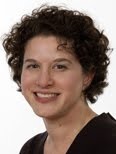
The job of a writer is to tell the truth, but what if that truth hurts those you love? Jennifer Rosner, the author of If A Tree Falls: A Family's Quest to Hear and Be Heard wrote an astonishing guest post on just that topic. Thank you, Jennifer! (Don't forget to watch the great Youtube clip!)
For years, I evaded my mother's questions about the book I was writing. I was vague even about its genre (a memoir). "There's some fiction in it," I'd say, as a portion of it (though not the portion about her) was fictionalized.
Being a mother myself, I knew intuitively that there was no mother alive who would want her child to write down and make public (by publishing) the stuff I was writing about my mother.
I went ahead with the writing, though, chronicling the deafness in my family and in particular, my mother's deafness – how she sometimes failed to hear me, failed to listen to me, as I was growing up. It was tough material, raw and painful.
For a while, I was just writing it – journaling it, sharing it only with the members of my tight writing circle. And the writing yielded perspective – it led me to a deeper understanding of my mother's experience, her struggles and her challenges. It humbled me, brought into view my own limitations, and led me to find forgiveness, both of my mother and of myself. Over time, the writing became polished, it took shape in book form. It encompassed far more than my experience of my mother; it grappled with the basic human need to hear and be heard. I found myself yearning to express my thoughts on this more widely.
I got an agent and she began sending the manuscript around to publishing houses. As the process got underway, I panicked. Through the writing of my book, I had come to feel better about my relationship with my mother than I'd had in decades. Yet here I was hurtling into a catastrophe: if the book got published, she would read it and we'd unravel. I considered halting the process. Maybe this really was a book just for me – a journal of my experience, one I needn't share. The writing process had been healing in its own right. What further purpose would be served by sending it into the wider world? As it was, the very process of trying to get the book published was trying – as I waited for publishing houses to decide whether to accept or reject it, I found myself spending whole afternoons manically eating chocolate chips by the handful. Maybe this was a weird "ego" step I needn't take, especially as its gains would surely be undercut by the dissolution of my connection with my mother.
At one point, I considered sending the manuscript to my mother in advance of any publication decisions. But I was too terrified. I made an appointment with a child psychologist, and entered the office (at age 43) as a "child," asking for advice about how to manage things with my mother. The psychologist's advice was: you can't manage things. She will have her reaction, and it's not for you to control. Ugh!
Using a different means to test family reaction, I gave my sister a draft of the manuscript to read. While she thought my portrayal of our mother was unquestionably true, if not soft-pedalled, she became unaccountably upset about my mention of a menu selection she made at a diner one night (she ordered the roast lamb chops). This didn't bode well.
I called my father, hoping to solicit his private advice. I explained that some of the material was difficult, and that I was considering pulling my manuscript out of the publication process. With judgment undoubtedly colored by paternal pride, my father urged me to stick with it. When my book got accepted, I requested the use of a pen name. How liberating! I could be anyone. Mercedes Almeida. Genevieve Benoit. A friend suggested I use the name Elsie Gezeltzer. My mother would never need to know that I published a book! But my editor said no. Despite the swath of historical fiction that ran through it, my book was categorized as a memoir. My editor believed that the use of a pen name would cast doubt on the veracity of the book. She refused to do it.
I called my father again. Again, he urged me to go ahead. "But, Dad, you haven't read it," I warned. He was resolute.The book came out on May 1, with my name on the cover. I received an author copy, and began constructing a letter to my mother on the inside cover. My sister called me to say they already got a copy– my father couldn't wait and ordered it on Amazon.
My chocolate chip consumption doubled, tripled, as I waited for my mother to read it. She didn't. A month went by. Two months. I called her on the phone. "Mom, you don't need to read it. But I do need to know: are you going to?"She said she was.
One night, a few weeks later, my mother phoned me."Jenny, I read your book."
I thought I'd sink through the floor.
"I read it backwards," she said.
"Huh?"
"I read it backwards. The last chapter first, then the next to last chapter, and so on."
I had told my mother that the book was rougher at the beginning; that it got easier toward the end. (I had also made her promise that, if she started reading it, she would read it through.) Maybe this backward reading was a gracious strategy, a way to get us through this. "How did it flow?" I couldn't help asking. I had spent over two years on the book's complicated braided structure.
"It's a beautiful book, Jenny. I realize that I had trouble hearing you. I was overwhelmed with the four children in five years, and with my hearing loss on top of it. I am sorry."
I couldn't believe my ears.
For the next week, I was on a high. My mother wasn't angry! She understood my feelings. The weight of years, worrying about her reaction to my book, slid off my shoulders. My writing had brought us closer. I eased up on the chocolate chips.
Shortly after this, I got a call from a different family member who shall remain nameless(!) - a heretofore enthusiastic supporter, who had mailed copies of my book to all her friends. In the call, she expressed great upset: upset that she wasn't in the book.
A note to memoir writers: The bullets always come from the most unexpected direction...
Renée Thompson talks about The Bridge at Valentine
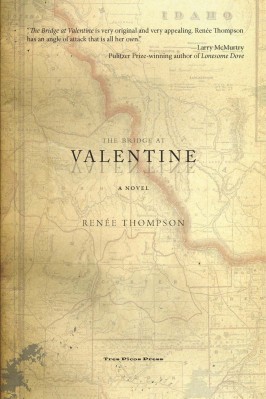
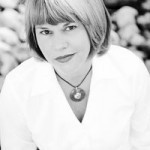
Who can resist star-crossed lovers? Not me. And especially not when said lovers are in an imaginative, fiercely moving new debut, Renée Thompson's THE BRIDGE AT VALENTINE (Tres Picos Press). A retelling of Romeo & Juliet, set in 1890's Idaho, the book tells the story of July Caldwell, the daughter of a sheepman, and Rory Morrow, the son of a cattleman, and their fathers' desire to control the rangeland and their children. Renée expertly crafts a protagonist willing to oppose her Mormon father by falling in love with a Gentile, exposing a world where trouble comes not from the head, but the heart. Ultimately, July learns that women trapped by fate or circumstance have a choice, but with choice comes consequence.
Thanks, Renee, for letting me ask you all these questions!
Where did the idea of this novel come from? How and why did you play with the whole idea of Romeo and Juliet?
I was reading John Steinbeck's EAST OF EDEN, and was struck by his use of an allegory – the story of Cain and Abel from the Bible's book of Genesis – to create his characters and plot. Until then it hadn't occurred to me to try such a thing, but I was so captivated with this technique that I was determined to try it too.
About the same time, I happened to be reading my grandmother's Book of Remembrance, which is a Mormon journal of sorts. In it, she recounts a story where a cattleman named Alex Durty shot and killed a sheepman, Tom Nook. As soon as I read that, I knew I had the makings of a Hatfield versus McCoy scenario, but I knew too I didn't want to write a traditional Western. In trying to think of similar plots, it occurred to me I could use Romeo & Juliet as a template, which would serve as a guide, knowing too I would radically alter the plot. That template provided the primary characters of July Caldwell (Juliet Capulet), Rory Morrow (Romeo Montague), Preston Forbes (Paris), Tom Blakely (Tybalt), and Mads Larson (Mercutio), and allowed me to fashion a story that was uniquely my own.
You live in Northern California, but all the scenes in Idaho are achingly alive. What was your research like?
Researching the novel was a joy, and one of the best trips my husband Steve and I have taken together. Steve is a former wildlife biologist and range conservationist, and we drove to Idaho in the late summer – a scouting trip, of sorts – to check out the landscape. Because my grandmother's father was a sheepman, I wanted to see where she had grown up, and to understand how July's father's ranch might fit into my vision. Every so often we would stop so Steve could point out various grazing concerns – where sheep or cattle had overgrazed the land, and where it had been well-tended. We had lived in southeastern Oregon when we were younger, so I knew sagebrush well, but he introduced me to rabbit brush and bitter brush, and helped me understand what a switchback was, and a swale. We took a lot of photos and when we got home I created a map on butcher paper, using felt pens and prints of the photos to forge my fictional homestead. It was a great tool, as it included, for example, mileage from July's house, near the town of Morning Tree, to the bridge at Valentine, and then on to Rory's ranch. I'm directionally challenged, so referring to this map kept me from making mistakes in my writing that I might have otherwise made.
I also met with two sheep families – one in Loma Rica, California, and another in McCall, Idaho, and talked to cattle ranchers about grazing issues and opportunities. I read a lot. And the mother in Amy Tan's novel THE BONESETTER'S DAUGHTER inspired the voice of my Chinese sheepherder, Pun.
I love the whole idea of a female look at the tough American West, especially with such a strong character as July. How did you go about creating her?
I wrote the last scene first, and that gave me a solid appreciation for and understanding of what kind of woman July would become. Readers often ask if I am July, and the answer is no. Like most writers, I gave my protagonist qualities I wished I possessed; July was braver and more adventurous than I was as a young adult – I'm afraid of horses! What we have in common, though, is a serious respect for and love of the land, and a belief that God and Church exist in the outdoors.
I'm always interested in process, so can you talk about the writing of this book?
When I'm writing a novel, my husband tells me I'm my own worst boss. I'm pretty disciplined, which means I start writing at 9:00 a.m., keeping at it until I've completed 1,000 words. Sometimes it takes all day. Sometimes I don't make it, stopping after six hours or so to work on something else. I'm not speedy and I'm not prolific. The worst day writing I ever had netted 276 words. The best was 1,900, a rarity.
What's obsessing you these days and why?
I wrote a short story called "Radio Gal" that I had hoped to workshop at Sirenland last spring, but it wouldn't come together. I've destructed and reconstructed it maybe five times now, and it's still not working. I've let it go for the time being, but it's haunting me. I'm hoping I'll be able to use at least some of it in another story I'm thinking about, but maybe not. (It might be like that comment you made on Facebook once, Caroline: "I just deleted 10 pages and kept ONE line.")
What question didn't I ask?
I've been asked if a sequel to BRIDGE is planned, but I'm inclined to say no. I think I've told the story.
January 7, 2011
Eleanor Brown talks about The Weird Sisters
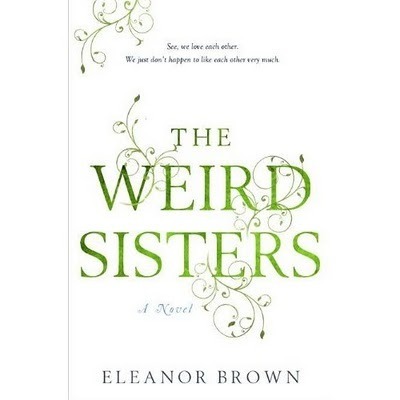
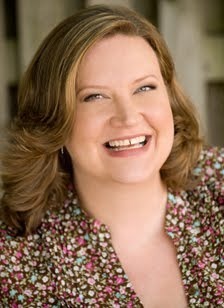
Recently, a manuscript came into my office with a request for a blurb. It was a debut, which I'm always partial to because I want to help new writers, and it had a great title: The Weird Sisters. This novel knocked me out from the first page, to the point that I couldn't do anything for the next few days but read. It's deliciously witty, incredibly smart, and undeniably moving, as it reveals the lives of sisters, the deeper meaning of Shakespeare, and the surprises of life. I fell in love with the book, and not only gave it a rave blurb, but contacted the author Eleanor Brown, who is as warm, funny and wonderful as her novel (which, by the way, is racking up the raves and the honors!) Be sure to watch the great book trailer, too!) Thank you, Eleanor, so, so much for answering these questions!
Tell us about how The Weird Sisters came about?
Like most stories, I think, it came together piece by piece. I'd wanted to tell a story about family and birth order for a long time. When I was in grad school, I was playing around with different voices and styles and I become interested in first person plural narration ('we' and 'our') and wondered what kind of story would require it. And as my friends and I floundered around in our twenties and made all kinds of ridiculous mistakes, I started thinking about what it means to be an adult and why some people have so much trouble with growing up. Add in a wonderful class on Shakespeare, a study abroad program in Oxford, a whole lot of daydreaming, and The Weird Sisters was born!
Does being a first novelist coincide with your visions of what it would be like?
I don't know that I really had a vision! I sat down to sign some books the other day and I turned to my sweetie (J.C. Hutchins, who is also a writer), and said, "I have no idea what to write." And he figured I was the only author who had never considered how she would sign her books.
One thing that has surprised and pleased me is how wonderfully supportive people are - the folks at Amy Einhorn Books/Putnam, old friends on Facebook, fellow authors and writers and book bloggers and librarians and readers - everyone is just so lovely. Readers want to find stories they will fall in love with, and I'm delighted when they find that in The Weird Sisters.
Did you reread your Shakespeare as you were writing, and what was that process like?
I did scandalous amounts of research, reading, and going to plays and watching movies. It was great fun - Shakespeare's plays in particular are so rich and people have done such inventive things with them. I remember being in Oxford and seeing an open-air production of A Midsummer Night's Dream in which the production used the nearby stream to have Titania and Oberon arrive in an actual boat! It was magical.
Unfortunately, as I wrote, I realized that a great deal of my research wasn't going to be used - The Weird Sisters is about a family so immersed in Shakespeare that it's become nothing more than a sort of shorthand for them. They've already had all the exciting thoughts they're going to have about Shakespeare, so it wasn't like they were going to turn to each other in the middle of a scene and start discussing the use of numbers and numerology in the plays (yes, I actually read that article).
But I don't feel that time was wasted - it helped me understand how the family thought and functioned, I got to see lots of wonderful acting, and I fell in love again with Shakespeare's language. There's a reason that guy has hung around for a few hundred years - he's pretty good.
What IS it about sisters that is so compelling? Do you have a sister yourself?
I think sisters have the potential to have incredibly complex and emotional relationships. The love and envy and friendship and hatred that can be present in any relationship are amplified with sisters. I am the youngest of three sisters, and I am particularly interested in the way our birth order shaped our personalities and carved out roles for us that have persisted long into adulthood and re-emerge whenever we're all together.
What's obsessing you now? (And what's up next as far as writing?)
I'm thinking a lot about love and marriage and divorce and how they all fit together. I'm working on another novel that I hope to finish this year, but I'm awfully superstitious about talking about works in progress, so I won't say more!
What question didn't I ask that I should have? (P.S. Eleanor's answer shows you what kind of amazing person she really is--wonderful as well as brilliant.)
You should have asked which Caroline Leavitt book is my favorite, so I could say Girls in Trouble. I read it when I was chaperoning a trip of 120 seventh graders and I absolutely credit it with preserving my sanity (such as it is). I love reading all the authors you have in to visit almost as much as I love reading your novels.
January 1, 2011
I spill the beans on Julianna Baggott's blog
December 30, 2010
Jessie Sholl talks about the incredible DIRTY SECRET
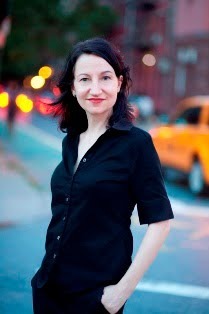
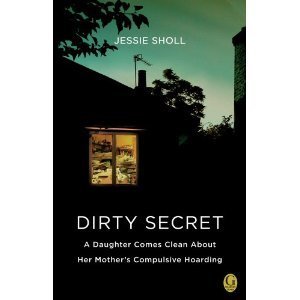
Trust me, you have never read a book like this. I'm so honored to have Jessie Sholl here, and I am mortified that I muffed my day to post this (I had a family emergency.) But here it is, and thank you so, so much Jessie.
Thank you so much, Caroline, for letting me do a guest blog post. As a longtime reader, I'm very happy to be here! I've decided to do a Q&A with some of the questions I'm often asked about my memoir, Dirty Secret: A Daughter Comes Clean About Her Mother's Compulsive Hoarding—on sale December 28, 2010.
What made you want to write this book?
Dirty Secret began—in my head, anyway—about seven years ago, when I happened to tell my husband about how I used to stare out the windows of my elementary school when I was ten; I'd gaze back and forth between my mother's house and my dad and my stepmom's, and have very different visceral reactions when I looked at each house. It was just a short anecdote, but as soon as I was done he said, "You know you need to write about this, right?" which of course I laughed off. I couldn't imagine ever telling anyone besides him about my mother being a compulsive hoarder.
Then, a few years later, I joined the Children of Hoarders support group; the shame and embarrassment we were all carrying around began to seem ridiculous. And unnecessary. I hoped that by "coming clean," about my mother's hoarding, the secret would lose its power. And that scene about looking back and forth between the two houses ended up being the first one I wrote for the book.
In recent years, the concept of hoarding has gone mainstream, thanks mostly to television shows like Hoarders and Hoarding: Buried Alive. What do you think about the presence of compulsive hoarding in national media and pop culture?
Overall, I think the television shows about hoarding are a good thing. Occasionally they can feel exploitive, but I like the fact that people are beginning to understand that compulsive hoarding is a mental illness and not laziness or selfishness, which is what some people used to think. The stereotype of the crazy cat lady is beginning to seem as outdated as the "hobo with the knapsack," and that's great.
At one point in the book, you mention that other people reacted positively when you told them about your mother's disorder. Did this surprise you?
This did surprise me. The most rewarding part of writing the book so far has been those moments when someone tells me about their mother, brother, cousin being a hoarder; every time I hear it I feel less freakish and it seems that the person does as well. I also really appreciate the fact that no one has ever judged me harshly. Maybe that expression is true: all our secrets are the same. I only wish I'd known it earlier, because I spent way too long being ashamed of something that didn't warrant it.
For more information about Dirty Secret, please visit www.jessie-sholl.com/blog. You can watch a trailer for the book here:http://www.youtube.com/watch?v=J78T_KgvqcU.
December 26, 2010
Bad book tour tales!
December 24, 2010
Pictures of You is a Costco Bookclub Pick!
My huge and humble thanks to Pennie and to Costco.



